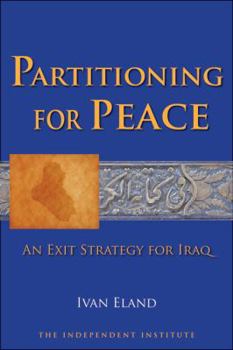Partitioning for Peace: An Exit Strategy for Iraq
Combining a history of Iraq and its dominant sects with an acute awareness of the political machinations fomenting worldwide, this keen military analysis offers a practical exit strategy for U.S. armed forces in Iraq--partitioning, a unique strategy that has been successful in other chaotic political situations.
Format:Paperback
Language:English
ISBN:1598130250
ISBN13:9781598130256
Release Date:April 2009
Publisher:Independent Institute
Length:144 Pages
Weight:0.50 lbs.
Dimensions:0.5" x 6.0" x 8.7"
Customer Reviews
3 ratings
A choice pick for any who want new ideas on the war in Iraq
Published by Thriftbooks.com User , 15 years ago
Invasion is easy. Getting out is the hard part. "Partitioning for Peace: An Exit Strategy for Iraq" offers one man's ideas for America leaving Iraq better than they found it when such an idea sometimes seems impossible. Partitioning is the basis of his idea, and he presents his ideas well. "Partitioning for Peace" is a choice pick for any who want new ideas on the war in Iraq.
An Exit Strategy for Iraq That Might Work!
Published by Thriftbooks.com User , 15 years ago
This is a short little book of 119 pages that can be read in a single sitting. Author Eland fully makes his case without mincing words and documents his data and history in a scholarly fashion with extensive end notes. He presents a solution to our wrong-headed policies in Iraq that could actually allow the U.S. to exit Iraq without substantial loss of face and with a solution that could be permanent. This exit strategy is to establish a Confederation of three countries closely following the three Iraqi states in the Ottoman Empire: Kurdistan (Mosul), Baghdad (a Sunni-dominated state) and Basra (Shi'i.) The British understood that these areas were very different from another, and kept them in being and even negotiated away Kurdistan to the French for their colonial use. The British subsequently welshed on giving Mosul to the French, and Iraq came into being under British mandate (occupation.) It is important to note that the three very different states have never been able to peacefully co-exist under the same flag for any substantial length of time and have required tyrannical control from strong rulers. The Kurds revolted against control in Baghdad in 1920, 1923-1932, 1935-1936, 1945, 1958-1962, 1964-1970, 1974-1975 and 1991. The Shi'i have revolted in 1920, 1927, 1930-1933, 1935-1936, 1956, 1969, 1974, 1977 and 1991. Yet still the Bush and Obama administrations are still attempting to form a federal state that will allow the withdrawal of American troops without falling immediately thereafter into chaos. What blind idiot had his head in the sand on this one? Can anyone imagine such a solution in the U.S. with more or less permanent fighting going on between states? The author does not pretend to believe that a confederation will be perfect, but it has a much better chance of succeeding that a federation. To those that fear the Shi'is will join Iran, consider that the Iranians have the same religion as the Arabs in Southern Iraq, but they are not of the same ethnic background, nor do they speak the same language. The author also points out the dangers of an incomplete partition (e.g. leaving substantial minorities of one of the states in one of the other states.) In Iraq's case, a good deal of the population has already sorted itself out by moving from one area to another (voluntary ethnic cleansing, as it were.) Still, more population swapping will be necessary such as what Turkey and Greece accomplished in the 1920s. It can be done, and it is possible to establish three states with homogenous populations that can grow into stable nations. Of the three, the most troublesome is the Sunni central state with 30% of the population (the Kurds are 20%, and the Shi'i 50%) becaume it would be the weakest economically (the other two have extensive oil deposits.) As a potential solution, the Baathist Sunnis could be allowed to join Baathist Syria under certain conditions. Although this solution exhibits some
In Praise of a This Tactic
Published by Thriftbooks.com User , 15 years ago
"Partitioning for Peace has identified the major pitfall facing Obama's desire to leave Iraq. He and his foreign policy experts, as well as anyone interested in an exit strategy from Iraq should read this thoughtful analysis." --Thomas Gale Moore, Senior Fellow, Hoover Institution, Stanford University "The timely book Partitioning for Peace foresees the eventual failure of U.S. efforts to forge an effective central government in Iraq. His alternative of partition is a way to resolve serious communal divisions with deep historical roots and remains an option that unresolved conflicts may force upon the country irrespective of U.S. policy." --James H. Noyes, former Deputy Assistant Secretary of Defense for Near Eastern, African, and South Asian Affairs "In Partitioning for Peace, Ivan Eland writes a common sense challenge to the conventional wisdom that stability is best served by the continuation of every country currently on the map. In fact, holding countries together can be a force for instability, as Eland convincingly demonstrates in the case of Iraq. Where people overwhelmingly don't want to be part of a state, as in the case of the Iraqi Kurds, or disagree violently about the character of their state, as is true of the Iraqi Shiites and Sunnis, partition can be the more stable and peaceful outcome." --Peter W. Galbraith, former Ambassador to Croatia; author, The End of Iraq: How American Incompetence Created a War Without End





